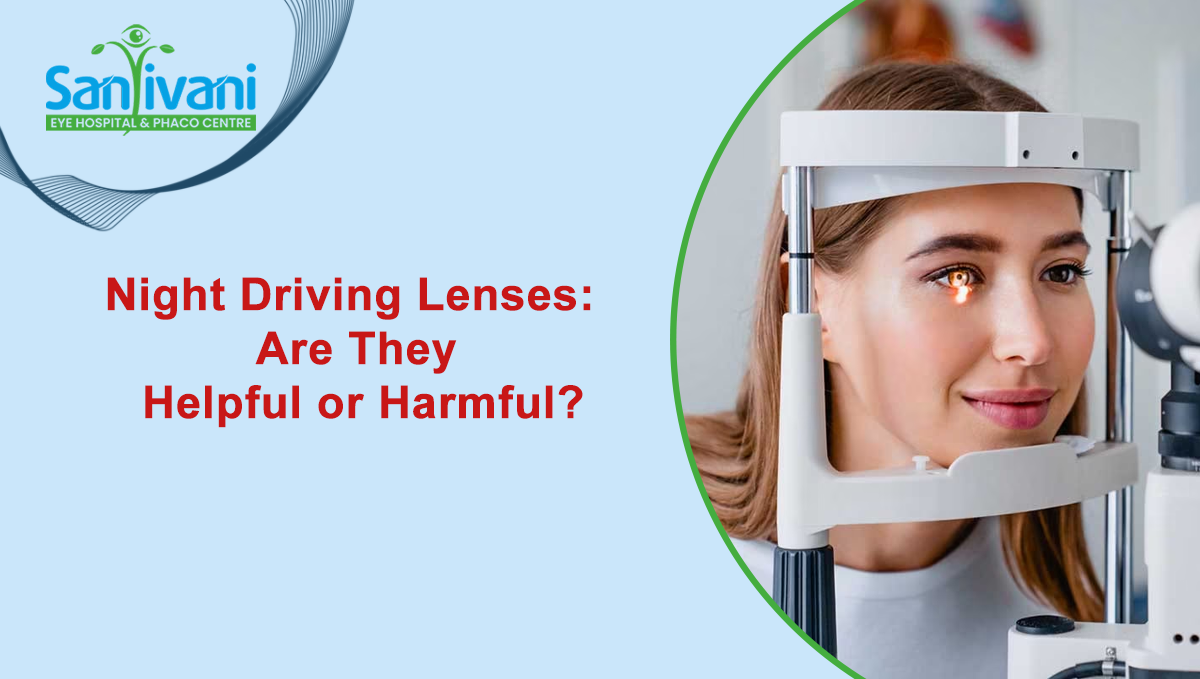
Night Driving Lenses: Are They Helpful or Harmful?
Introduction
Night driving presents unique challenges due to reduced visibility, glare from headlights, and decreased depth perception. In response to these challenges, specialized lenses marketed as "night driving glasses" have gained popularity. However, there is ongoing debate about their effectiveness and potential drawbacks. In this blog, we'll explore the pros and cons of night driving lenses to help you make an informed decision.
Pros of Night Driving Lenses :
- Reduced Glare : Night driving lenses often feature anti-glare coatings or tinting designed to reduce glare from headlights and streetlights. This can improve visibility and reduce eye strain, especially for individuals sensitive to bright lights.
- Enhanced Contrast : Some night driving lenses claim to enhance contrast, making it easier to distinguish objects in low-light conditions. This can improve depth perception and overall clarity while driving at night.
- Protection from Harmful UV Rays :Many night driving lenses offer UV protection, shielding your eyes from harmful ultraviolet rays emitted by the sun and artificial light sources. Long-term exposure to UV radiation can contribute to eye health issues, so this added protection is beneficial.
- Customization Options :Night driving lenses come in various designs and configurations, allowing users to choose the features that best suit their needs. Some lenses may be prescription-based, while others are available as clip-ons or over-the-counter options.
Cons of Night Driving Lenses :
- Distorted Color Perception :Some night driving lenses alter color perception by reducing certain wavelengths of light. This can affect the ability to accurately judge the colors of traffic signals, signs, and hazards, potentially compromising safety on the road.
- Reduced Peripheral Vision :Certain lens designs, particularly those with strong tinting or coatings, may narrow peripheral vision. This limitation can impede awareness of surrounding vehicles, pedestrians, and obstacles, increasing the risk of accidents, especially in busy urban areas.
- Dependency Concerns :Relying too heavily on night driving lenses may create a dependency, leading individuals to feel less confident driving at night without them. Over-reliance on specialized lenses can obscure underlying vision issues that require proper diagnosis and treatment.
- Cost :High-quality night driving lenses can be expensive, especially if they are prescription-based or feature advanced coatings and materials. This cost may deter some individuals from investing in these lenses, especially if they are unsure of their effectiveness.
Tips for Safe Night Driving Without Specialized Lenses :
- Regular Eye Exams :Schedule regular eye exams to ensure your vision is optimal for night driving. Addressing any underlying vision problems, such as refractive errors or cataracts, can improve nighttime visibility without the need for specialized lenses.
- Clean Windshield and Mirrors :Keep your windshield, mirrors, and headlights clean to minimize glare and maximize visibility. Dirty surfaces can scatter light and reduce clarity, especially in low-light conditions.
- Use Proper Lighting :Adjust your vehicle's interior lighting to reduce glare and reflections on your lenses. Dim dashboard lights and avoid using high-beam headlights in traffic to prevent blinding other drivers.
- Stay Focused :Avoid distractions while driving at night, such as using electronic devices or adjusting controls. Maintain focus on the road ahead, scan for potential hazards, and drive defensively to ensure your safety and the safety of others.
Conclusion
the effectiveness of night driving lenses remains a topic of debate among eye care professionals and consumers. While these lenses offer potential benefits such as reduced glare and enhanced contrast, they may also have drawbacks such as distorted color perception and reduced peripheral vision. Ultimately, whether night driving lenses are helpful or harmful depends on individual preferences, visual needs, and driving conditions. It's essential to weigh the pros and cons carefully and consult with an eye care professional before investing in specialized lenses for night driving.